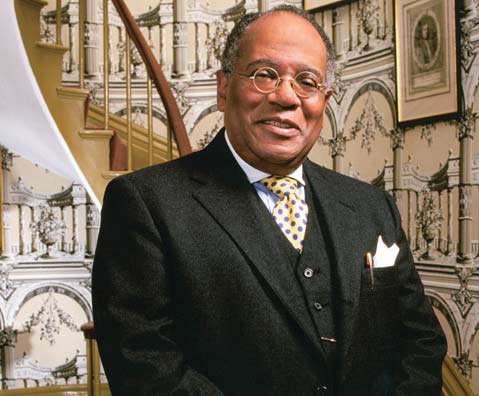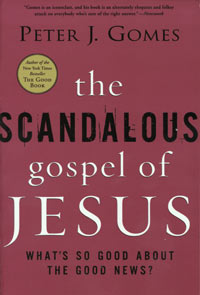Peter Gomes Has Good News for Hard Times
Harvard Minister Spreads the Scandalous Gospel of Jesus

The audience for a sermon is understood to be a captive one and, for their part, preachers are mostly willing to sacrifice God’s more confrontational messages to the comfort of their parishioners. Not so for Peter J. Gomes, the Plummer Professor of Christian Morals and the Pusey Minister in the Memorial Church at Harvard University. Gomes has made a career at Harvard since 1974 in part by being something of a contrarian. He’s also the author of several excellent books, including the 2007’s The Scandalous Gospel of Jesus: What’s So Good About the Good News? In both the particulars of his personal history and the muscular, learned eloquence of his prose, Gomes makes a refreshing contrast to nearly every stereotype of the contemporary Christian leader. Black, openly gay, and until very recently a Republican, Gomes truly remains a party of one when it comes to his exacting sense of Christian duty in the modern world.

In The Scandalous Gospel, Gomes has written a compulsively readable and compelling dismissal of contemporary evangelical platitudes while still managing to strike an optimistic chord of his own-one especially likely to resonate with highly educated skeptics. His books display more than just an extraordinary command of the Bible, its textual scholarship, and its commentary; the hymns, prayers, and practices of Christianity throughout history are also brought to bear on precisely those issues that confront all people of all faiths worldwide today.
Gomes advocates preaching not just Jesus, but the gospel of Jesus, which he defines as a larger conception of ministry. This allows Gomes to open discussions deemed closed by other divines, and to mediate contemporary disputes in ways that emulate Jesus directly. The purpose of preaching the gospel in this way is to ask Christians and others to move out of their comfort zones and into lives of active engagement with social change.
I spoke with Gomes recently from his office in Cambridge, Massachusetts.
Where are the non-conformist Christians of today? I see the nonconformist Christian tradition among the Pennsylvania Amish when they responded to the massacre at their one-room schoolhouse in 2006 with forgiveness. They preached love and forgiveness for a man who shot 10 little girls and killed five of them. Even to many devout people, I think their behavior seemed unusual. When people act in a way that is Christian, but contrary to expectation, then you have nonconformist Christianity.
What do you see as the contemporary meaning of the phrase “church triumphant”? Originally, the expression “church triumphant” was intended to describe a situation that could only exist in heaven, after the end of time, and of course we are nowhere near that. What it has come to mean, in a secondary but useful sense, is the church’s triumphalism. This refers to eras in which the church achieves a high degree of authority and consequently enters into a phase of complacency. The earthly church was never meant to be triumphant. On earth the church may be the church militant, but the attitude of the church triumphant is one that is reserved for heaven.
You have written about the hypocrisy of the White House prayer breakfasts, which you said amounted to little more than networking and photo opportunities. Do you expect that to change in the Obama administration? I have no reason to expect to be invited to this administration’s prayer breakfasts, so I have no expectations for them of any sort. Apart from our mutual association with an esteemed educational institution (Harvard) and the fact that we happen to share a race, I’m afraid that Barack Obama and I are not much connected. I must say that I am proud of him. I was particularly impressed with that speech he made in March of 2008-the one in response to criticism of Reverend Jeremiah Wright. That was a very good speech on the subject of race, and I admire the man for that and more. He is certainly admirable, the president-elect.
What is it that you mean when you speak of seeking a “bigger God”? As in what I said to Rick Warren; that “mine is bigger than yours?” [Laughs.] Just as God created man in his own image, people create a God from their own image, and the unfortunate consequence of the latter is that we end up with belief that is parochial and limited in view. People imagine a God who plays favorites, or meddles in human affairs for partisan reasons. This God of the small minds is never prepared for the worst.
Is there anything for to learn from the current financial crisis? Is there a moral dimension to what has happened on Wall Street? Oh yes, there is unquestionably a moral dimension to the financial crisis. But what interests me more is the degree to which the situation represents a failure of imagination. It has been experienced by those involved as a crisis of secular faith. There were many bright and competent individuals involved in finance who believed in this market, and there were others involved who had given up believing long ago. The institutions gave support to a secular faith in success that proved unsustainable, and now those who lived by it are being brought to question that belief.
Why are you so sympathetic to the “non-heroic” side of Jesus? I have nothing against the miracles, but for me the qualities of Jesus that endure for contemplation are his stability and serenity. I like thinking about what gets Jesus from day to day. The Gospels are full of wonderful evidence about what took Jesus from morning to noon to night, and these details are great sources of spiritual insight. The portrait is of a man living through these highly dramatic events, yet who sees beyond them to their real meaning in the context of an eternal life. I feel this is someone I want to know.
Are you really such a grinch as to have confessed a dislike for Advent? That’s right, I wrote that I was impatient with Advent, and I still am. I’m sick of the precious passivity of it. All this waiting and hoping and opening of cardboard windows-no thank you. It’s not that I have anything against waiting in eternal hope for the coming of the Messiah; it’s just that I want to be up and dealing with the thing. It’s like what you see in the first letter of Peter-what kind of people should we be while we wait? That’s the question I am after asking.
4•1•1
UCSB’s Arts & Lectures presents Reverend Professor Peter J. Gomes’s lecture, titled Transformation in Our Time and Place-Hope and Promise in Difficult Times on Friday, January 9 at 7:30 p.m. at the Santa Barbara First Presbyterian Church (21 E. Constance Ave.). For tickets and information, call 893-3535 or visit artsandlectures.ucsb.edu.



